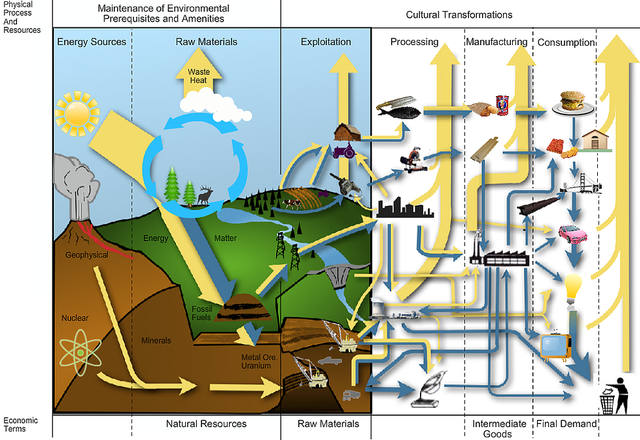
Photo by Postdiff, CC BY-SA 3.0
I was writing an article on invoking characters when I found myself side-tracked by a flea market. I’ve decided to run with it.
In the world we’re constructing, how do people acquire goods? It’s one of those innocent-looking questions that can send any two people in widely different directions. We could begin with the question of scarcity: in the society we’re writing, are there people without resources? If so, is the scarcity spread evenly across the population? If only some are kept short of resources, how does the economic framework enable that segregation and inflict that suffering? Who controls that framework? The answers to those questions will begin to expose levers of economic control and disruption that we can point out to our player characters. Stories abound.
Is the acquisition of goods related to power or authority within the setting? If the rich don’t make the rules, then what benefits do they gain from their wealth? Do they gain reputation from providing substantial annual donations to a neighboring culture, or from holding lavish parties? Do they use goods to solidify their social network? If so, does that look like an exchange of guest-gifts, or does that look like paying bribes? If, in contrast, the acquisition of goods is related to power or authority in the setting, do we intend our PCs to become wealthy as a means to power? If not, how will they gain access to power in the setting? What stories do we want to tell?
What mechanisms exist for participating in the economic game? If the society ties work output to resource gain (i.e, jobs get you money), what does that look like in the setting? If the society does not tie work output to resource gain, then how would one get rich? Is it possible to be rich in the setting at all? If jobs are tied to resource gain, then how are jobs ‘rated’? Who gets the jobs? Who controls the access to jobs? Education is a related, vital resource, and similar questions arise.
Answering these questions can take us to some weird places. For example, imagine a society in which everyone is wealthy, in the sense that everyone has plenty of money to buy things. However, access to shops is strictly limited. We can’t get into a shop without winning a lottery. This conjures up some interesting pictures: a thriving black market, bribery of lottery winners, etc. It also highlights a snarl in the word ‘wealth’: what does wealth mean, anyway? The ability to acquire goods? If so, the only ‘wealthy’ ones in our imaginary society are the lottery-winners, as they are the only ones who meet all the conditions necessary to acquire goods. If wealth means something else, what? Personally, I suspect that ‘wealth’ is one of the words economists argue over, like physicists arguing over ‘time’.
These are tough topics to tackle. In the society in which I am sitting as I write this, access to resources is definitely biased. I’ve lived in a house with no heat, where the only source of electricity was a single outside outlet put in by a very kind electrician – and I don’t feel like I’ve ever really touched the hem of poverty, thanks. I had the opportunity to go to a state school on scholarship and earn a degree in a hard science, which, even in these times, translates as, “basis for a living wage.”
Right, so I started this intending to write a light-hearted exploration of different kinds of shopping and, well, here we are. But it’s an important place, so let’s step back over to world-building and keep going.

Illlustration by Charles A.S. Hall, CC BY-SA 4.0
The choices we make in designing our setting economy have profound implications for the tone of our setting, for the level of comfort people will have in exploring our setting, for the kind of stories that people will want to use the setting to tell. So many choices, so many stories. That’s great. I doubt anyone should try to answer all the questions for any single setting, and I doubt anyone can foresee all the implications of their choices. That’s fine. We don’t need to foresee all the consequences. We do feel we need to make conscious choices for elements that we decide will be central to our story. Let’s take a less oddball approach than the “have money, but can’t spend it” culture we postulated above. We’ll construct two example cultures. First, we’ll work forward, answering a few of these questions and seeing what kind of a culture those answers develop. Second, we’ll work backward, starting from the question, “What stories do we want to tell?” and imagining an economic framework that could lead to those stories.
Is the acquisition of goods related to power in this setting? Let’s say “No”. People can be wealthy, but being wealthy in this imaginary setting is not a direct route to compelling or controlling the actions of others.
My partner wants to make this a science-fiction setting. Challenge accepted. The setting is now a far-flung network of space stations and occasional planets. People are thinly spread. Space is always trying to kill you. Tragedies and disasters happen. People are more motivated to help groups that they perceive as “kind”, “friendly”, and “generous”. So, the people living in these stations and on and around these planets developed a habit of sending out gifts to other locations in all directions. This is part of a concerted attempt to be perceived as “kind” and “friendly” by other groups. Those who contribute the most to these “gift ships” gain reputation in the setting. Shrewd media campaigns and sports also play a role in influencing other groups.
Resources are gained in the usual way: gather solar power, mine asteroids, scoop solar wind particles, and work hard to turn those raw materials into air, water, and other useful things. I am now imagining space-fishing boats casting nets in Saturn’s rings, hauling in catches of ice and small rocks. A sideline, but you can bet it will make a comeback now that I have thought it. We could keep going, working out who controls the means of production, who has access to education, and what roles jobs play in the economic system, and we might re-visit this in another article. For now, we’re going to switch sides, and step from story to economy.
What sort of story do we want to tell? Let’s say that we and our players agreed that we want the PCs to confront temptation. Wealth is a classic temptation. If we want to use wealth as a temptation, then one easy starting point is to create a society in which a small number control most of the wealth and inflict the sufferings of scarcity upon the rest. That magnifies the temptation of wealth.
Of course, in a society like this, there will be stories of people who start poor and end wealthy through direct participation in the economic system. Those are rare. This society is like a casino: during the casino’s lifetime, a few gamblers will walk away a bit richer, but the casino’s wealth is staggering. But there are back doors: ways to end up wealthy outside of that direct participation. We know our players. They will always, always look for back doors. So, a related question: do we want to tell stories that look more like heists or more like rebellions?
Here’s one back door: keeping track of property is a vital part of ownership. So, what if keeping track of property in this society is complicated? The wealthy need to hire special staff to keep track of their stuff. People spend years training, gaining highly abstract and abstruse knowledge, just to keep track of property. Now your player characters have several ways in: one of them could be one of these specially trained individuals; they could use social engineering or simply befriend one of these specially trained individuals; they could find a loophole in the system, or help a maverick mathematician build a new system that would “help the world.” Then your PCs co-opt the new system to steal the wealth. Whether this complicated system looks more like the modern IRS or more like a high fantasy “magic of the true name” is up to you.
To close, here’s an idea for solarpunk fans out there: imagine a society in which the primary use of wealth is to invest in infrastructure and ecologically positive projects. You have money, so you invest that money in the new wind farm. These investments mean the wind farm gets finished, which benefits everyone, but you gain extra status in the society because of your significant investment. This could lead to certain social ‘extras’, as well. Take it from there. We certainly will.
0 Comments